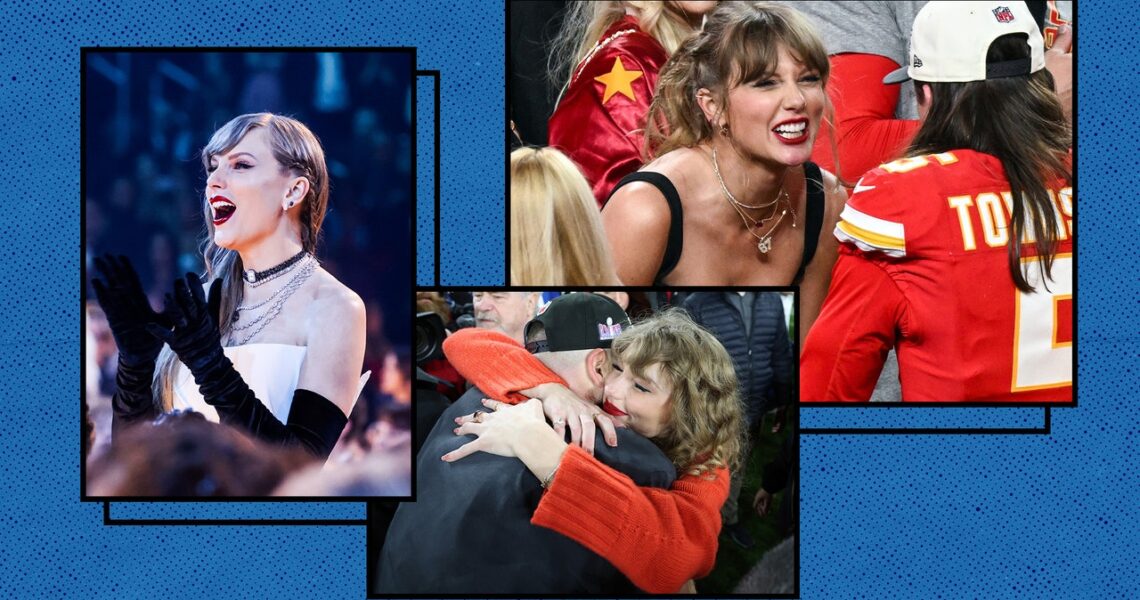Taylor Swift’s New Era: Candid Photos and Authenticity
She stopped “dating, flirting, or anything that could be weaponized against me by a culture that claimed to believe in liberating women but consistently treated me with the harsh moral codes of the Victorian era,” she wrote.
It didn’t work. Swift is trying something new now, Kelce on her arm: Showing up and not giving a f*ck what you think. Take a picture and post it, it’ll last longer. Please welcome to the stage: Taylor Swift’s candids era.
Swift has cared about what you think, and I think, for a long time, forever trying to live up to the unobtainable title of “good girl.” Her career success, at least, is indisputable: She’s a billionaire with 11 studio albums and the most album-of-the-year Grammys of all time. She’s an economy unto herself, the impact of her Eras Tour on local spending so notable that even the Federal Reserve has studied it. We can count the number of trucks in her tour fleet (At least 90!), lifetime Grammys (14!), the number of seats in each stadium she sells out, and the money she rakes in.
But there’s no quantifying the ups and downs of public opinion. Swift has literally grown up in front of us, and the magnanimous everygirl persona she presents the world planted the seed for fans’ parasocial relationship with the singer. Swift has a song called “Willow.” A quick search reveals that a willow tree reaches its mature height within 15 or 20 years, its roots deep enough and trunk strong enough to withstand storms and hardship. Fans have had 17 years to grow their relationship with Swift—the leaves may drop, and the branches may be bowed, but that sucker isn’t going anywhere without work.
And there have been storms aplenty, nothing in Swift’s life passing without comment, including her fashion choices, haircuts, romantic relationships, friendships, you name it. Even when she won, she couldn’t win, a phenomenon best exemplified by her ongoing feud with Kanye West, beginning in 2009 when the rapper interrupted her female-video-of-the -year acceptance speech at the MTV VMAs to tell her and the world that, sorry, Beyoncé did it better. Years later, a dispute over a lyric in one of West’s songs referencing Swift pulled West’s then wife, Kim Kardashian, into the tangle, resulting in Swift’s now infamous 2016 statement in response: “I would very much like to be excluded from this narrative, one that I have never asked to be a part of, since 2009.”
And so she removed herself. Almost entirely. Beginning in mid-to-late 2016, Swift cut herself off. No interviews, no appearances, no concerts, no music. It was during this time that she reportedly—canonically!—left her apartment zipped inside a giant suitcase heaved by her security team to avoid being seen. Horror movies have the concept of “fridging,” referencing female characters’ mutilated bodies being discovered in fridges, their tragic ends merely a stepping stone along the (usually male) heroes’ journey to glory. Swift allegedly had to stuff herself into a suitcase to get out of the way of public opinion, her removal from the scene giving her critics room to bloviate without the satisfaction of seeing how she’d react.
“Nobody physically saw me for a year,” Swift said in Miss Americana. “And that was what I thought they wanted.”
But, of course, Swift is too much of a force to be totally excluded from the narrative, of her drama with West or any other matter. She came back, and this time, she didn’t want to be excluded from the narrative—she wanted to control it.
“I’ve been raised up and down the flagpole of public opinion so many times in the last 20 years,” Swift told Time’s Sam Lansky. “I’ve been given a tiara, then had it taken away.”
Swift reemerged with the release of 2017’s Reputation, a stadium-rock lashing out at the constant scrutiny she lived under, a bleach-blond declaration of war against the haters. It’s like Swift headed to the mall, shed that Limited Too persona, popped into Hot Topic, and came back with a studded bracelet and a scowl.
After that hard reset, setting the expectation that she could—and would—explore drastic changes in both her sound and personal style, she evened her keel and began to live not as Taylor Swift, human person, but Taylor Swift Inc., product and producer all at once.
She left her first record label, Big Machine, and got loud about her opinion of its new owner, West ally Scooter Braun, who then had control of her master recordings and back catalog. She called it her “worst-case scenario.” In 2020, when she announced that she would rerecord and rerelease her first six albums, her social media presence was tightly curated, her Instagram wiped of old content (currently, the first post on her grid is a cryptic 2017 teaser for what would turn out to be Reputation). No more goofy pictures with friends, no more road trips with Karlie Kloss.

